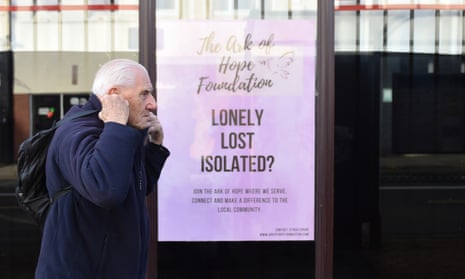Psychologists are reporting a rise in “pandemic burnout” as many people find the current phase of lockdowns harder, with an increasing number feeling worn out and unable to cope.
They warn that many are finding the latest lockdown more difficult because of a realisation that coronavirus will be around longer than expected, dashed hopes about an easing of restrictions, and a period of sustained stress similar to overwork, which has prompted symptoms such as fatigue.
Data also indicates people are finding it harder to stay positive, with 60% of people in the UK saying they are finding it harder to stay positive daily compared with before the pandemic – an 8-point increase from November, an Ipsos Mori survey found.
Emma Kavanagh, a psychologist and author, said she had noticed more people reaching out over social media. “We are tired and have been doing this for a long time and we had this initial array of coping capacity and it’s simply burnt out. When you look at burnout by definition you’re talking about being too stressed for too long. There is this experience where your brain reaches capacity and goes: ‘I cannot give the same mental attention to this any more.”
Kavanagh has been researching extreme environments in psychology, and said: “So what you find in these extreme environments, which is a nice analogy for where we are now in terms of unpredictability and uncontrollability … is that they find something called psychological hibernation which is the same as burnout.
“You see things like your concentration getting sluggish, you find it harder to pay attention and you have sleep and memory issues.”
But Kavanagh said people could come out of the current situation stronger. “People who have survived disasters have no control over it but most will exhibit post-traumatic growth, a small minority will experience long-term health effects. The vast majority will return to a baseline of function or exhibit growth.”
Steven Taylor, a professor and clinical psychologist at the University of British Columbia, said at the start people had little to no knowledge of what a pandemic was and then as restrictions eased there was a sense that it was almost over.
“Then the second wave occurred and people in many countries were back in lockdown. In technical terms, people were in a situation of ‘frustrative non-reward’. They thought they would be rewarded with an end to the pandemic, but that reward was taken away from them. Understandably, people were frustrated,” he said.
“More generally, the stressfulness of a pandemic is related to how long it lasts. People are exposed to chronic stressors as pandemics drag out over many months and multiple lockdowns. That wears people down.”
He said pandemic-related burnout was something people might experience where they feel “increasingly emotionally exhausted, despairing and irritable as the pandemic drags out”. He compared this to what the World Health Organization has called “pandemic fatigue”.
“Pandemic-related lockdowns and other restrictions disrupt our routines so that we no longer have fixed schedules or landmarks during our day … It can get to a point where every day is exactly the same. If there are no landmarks and little in the way of a fixed schedule, life becomes a blur, and people experience difficulty recalling what they did,” he said.
Julia Faulconbridge, the vice-chair of the division of clinical psychology at the British Psychological Society, said not everyone had the same experiences. She added that from a psychological point of view, the messaging that people had received had been hard to accept. “If you look back at early autumn things were getting worse but it was not so obvious for people. There was talk of what you would do for Christmas and vaccines coming.”
“Then suddenly it was like all of that got swept away … suddenly the vaccine started to look more shaky as we heard about mutated strains and then, of course, we moved into this really serious crisis of health that has come since January.”
She said many people would by now know someone who was ill or had died.
“The whole thing becomes a lot darker in terms of what we think we are living through,” she said. “I would not use the term burnout but if you have pressures and stresses and difficulties going on in your life, those are almost certainly going to be exacerbated by being in lockdown.
“Any sort of pinch point or difficulty and stresses get exacerbated, and the longer they go on the more the pressure can build up and we are often isolated now from our normal support structures. For me, it’s more than burnout, but people getting more and more trapped in difficulties … Every single person in this country is under stress to some extent or other in this pandemic.
“Stress affects our bodies in ways that are described as burnout. That long-term stress is different from short-term and has an insidious and profound effect on how we can function. Even if we are functioning fairly well, we are not functioning as we used to.”
